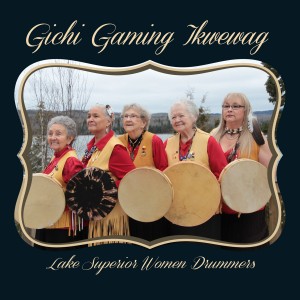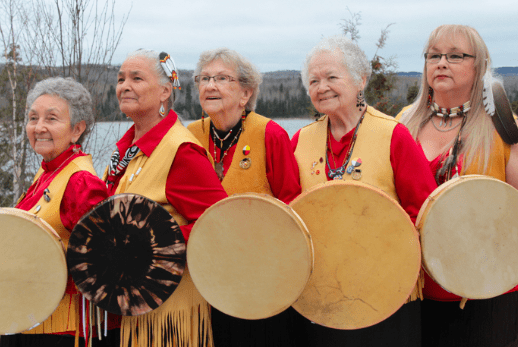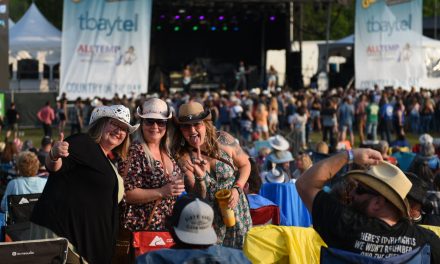A Dream Comes True for the Lake Superior Women Drummers
Story by Michelle McChristie, Photo by Cat Zechner
Marilyn Netemegesic never imagined she’d find herself in a recording studio singing and drumming with her friends and fellow musicians. Last August, she and five women from Gichi-gaming Ikwewag, the Lake Superior Women Drummers, started their journey to record their first album—a culmination of 10 years of learning, teaching, and healing through music.
The women joining Netemegesic were Mona Cormier, Susan Kwisses, Ruby Martin, and Simone Person, who live on the Red Rock Indian Band’s Lake Helen reserve and in Nipigon. Their drumming circle, which also includes Norma Fawcett and Donna Borg, is part of a revival of women’s drumming. “Drumming was important to medicine women, but the practice was lost when our people were denied their language and culture—the tradition has become more widely adopted and contemporary in recent years,” says Kwisses.
 Singer-songwriter Shy-Anne Hovorka has guided the women through this journey using her knowledge gained through almost two decades of working in the music industry. She helped the women through every stage in the process, from obtaining funding to recording and distribution. “The album was recorded at Rob Nickerson’s studio,” says Hovorka, “we separated the women into two rooms and recorded them live off the floor.” Using two rooms and two mics made for a cleaner sound and easier editing—the women were thrilled with the result.
Singer-songwriter Shy-Anne Hovorka has guided the women through this journey using her knowledge gained through almost two decades of working in the music industry. She helped the women through every stage in the process, from obtaining funding to recording and distribution. “The album was recorded at Rob Nickerson’s studio,” says Hovorka, “we separated the women into two rooms and recorded them live off the floor.” Using two rooms and two mics made for a cleaner sound and easier editing—the women were thrilled with the result.
“We wanted to record an album for a long time because we wanted to share the songs in our language, our dialect,” says Kwisses. “We didn’t think much about how we would do it, but Shy-Anne got the ball rolling.” “The women would have been happy with a mic set up in my living room, but I really wanted to help carry their message further—more people will listen to a higher quality, more professional recording,” adds Hovorka.
Kwisses says the songs carry messages of traditional teachings, stories of healing, and honour the Great Spirit—all were recorded in Ojibway. As a former Ojibway language teacher, Mona Cormier has used music in traditional teachings. The liner notes include the lyrics in Ojibway and English and the women hope that youth will start learning the songs and learning the language. “It’s a tool for revival; the songs are upbeat and children respond to the simplicity,” says Hovorka. “They are so used to overproduced music, but you can’t overproduce the sound of a drum.”
For the women involved in Gichi-gaming Ikwewag, the album represents much more than the culmination of a 10-year effort. “We want to leave a legacy, not only for our families, but our community,” says Netemegesic.
Gichi-gaming Ikwewag will be celebrating the release of their album on April 23 at the Lake Helen Resource Centre. The album is available at the Red Rock Indian Band office, Pelletier’s Gas Bar & Native Art Gallery, and on iTunes.














